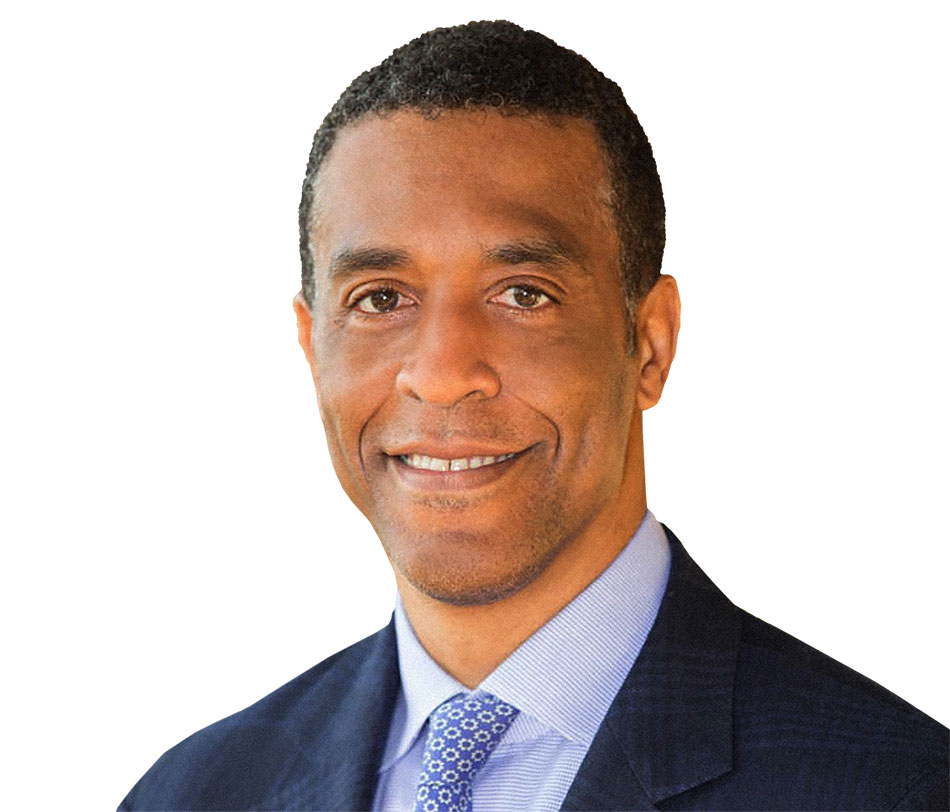Rey Ramsey: Leading the Digital Advance
New Centri Tech initiative’s goal: Optimize connectivity to improve quality of life

The smarter way to stay on top of the multichannel video marketplace. Sign up below.
You are now subscribed
Your newsletter sign-up was successful
Rey Ramsey is the CEO of Centri Tech, a new initiative designed to promote “digital advancement” — he says that “digital divide,” the current term of art, carries the wrong connotation. Ramsey is particularly focused on growing and leveraging the human capital it will take to get the job done.
Ramsey comes armed with experience in expanding access to technology and housing equity as founding chairman of One Economy Corp., a nonprofit that provided low-income homes with internet access, and as the former director of housing and community services for the state of Oregon.
His resumé includes chairman of Habitat for Humanity International and chairman of TechNet, a network of technology executives representing several million employees and almost $1 trillion in revenue.
Ramsey spoke with Multichannel News about the connectivity challenges and opportunities that have been generated, and exposed, by the pandemic. Here’s an edited transcript of that conversation.
MCN: You have just launched Centri Tech. Tell us about it.
Rey Ramsey: It is a social venture that is dedicated to digital advancement, meaning that we want to optimize technology to support people’s quality of life and standard of living. Our particular focus is on the ‘built’ environment.
MCN: The ‘built environment?’
The smarter way to stay on top of the multichannel video marketplace. Sign up below.
RR: Where people live. Making those buildings smart, so that it opens up a world of possibilities that support their needs and their potential. We are both a for-profit systems integrator and we have the Centri Tech Foundation that focuses on digital adoption and the particular applications of that technology.
MCN: And this is the same team behind One Economy?
RR: We are starting out with five people who were with One Economy, but we have a pretty large alumni group and I would think over time you would see some more people. I am hearing from everybody.
If we don’t take seriously and mobilize resources to do something about those outside the digital mainstream, then the economic divides will accelerate and get deeper. That is why I view it as an imperative to move on this.
Rey Ramsey, CEO, CentriTech
MCN: How will this differ from One Economy?
RR: A couple of things: Technology has created a lot more possibilities. Now you’ve got the Internet of Things and more interoperability, so it opens up lots of applications that didn’t exist. So we are going to be incorporating some of those, and we are going to be even more focused on systems, meaning policy issues.
MCN: For example?
RR: One of the things that will be different about this venture is the for-profit component as well as a nonprofit, which is the systems integration part.
MCN: And what does ‘systems integration’ entail?
RR: Going to low-income properties in communities and cities and working directly with networking those places and bringing in connectivity. We didn’t do that in a for-profit way at that level of scale, but we think there is an opportunity that flows out of the problem situation that we are in and that COVID revealed to us.
Think of us as a systems integrator that leads with social impact, so we are going to make the buildings smart, but in a way to open up applications to people.
MCN: Is this about digital equity as well as technology?
RR: The term that we use is ‘digital advancement,’ which gets out of just saying, ‘There’s a divide; plug the divide.’ We need to look at policies and practices in place and, very intentionally, we really have to go after making the built environment a bigger part, whether they call it digital advancement or a digital divide.
If you recall, when the whole digital divide movement started, everyone was talking about libraries and schools, and they are still important. But we have always said it’s [about] where you live.
Why is that important? Even before COVID-19, where you live shapes your culture and you want to build a culture of use, a culture of making it your own. Your home is a 24/7 platform. It doesn’t rely on you getting in your car and driving to a facility to use the technology.
Then COVID comes along and everyone is in a mad scramble. Now we’ve got to live, work, play, all from home, so it creates an urgency to think through systematic strategies to make home available to everyone in our society that wants to be a part of the digital economy.
MCN: The nonprofit part is about education?
RR: Education, yes, but we’re also putting a big emphasis on the workforce side of it because we think we have this interesting opportunity right now.
MCN: How so?
RR: If we’re going to do something about ‘the divide,’ it requires people. We need to network buildings. We need to develop services. We need to do a variety of things and that creates a unique workforce opportunity because we have a lot of people unemployed and underemployed,
So we have a program called The Digital Integrator, and that is about creating apprenticeship opportunities and career exposure for people who are on the sidelines and getting them to be the human capital to help us build out. It also creates an opportunity when you think about the environment because, if you want a building to be green, the building needs to be smart.
I am sure you are aware that people keep talking about jobs that go unfilled because they don’t require college. But a lot of times, people say they don’t have the credential or work experience or were not even aware of [the jobs]. We want to make more people aware of these opportunities. We want to create a career ladder that might start with an apprenticeship that can then lead to a better quality of life.
There are already amazing technologies in health that have proven their efficacy from a home standpoint. You just need to be more intentional about these things and do it through thoughtful design, rather than stumbling your way into it. Let’s do things by design, not default.
MCN: The Rev. Jesse Jackson has called access to communications the civil rights issue of this century. Do you agree?
RR: Totally. Jesse is right, and I have spoken with him about it.
COVID did a lot of things. There is, of course, the tragedy of loss of life and what it did to the economy, and it cast a spotlight on disparities. But what it has also done is accelerate the digitization of society.
If we don’t take seriously and mobilize resources to do something about those outside the digital mainstream, then the economic divides will accelerate and get deeper. That is why I view it as an imperative to move on this.

MCN: How have you been ‘moving?’
RR: We have been briefing people at the FCC; we’ve been having conversations with members of Congress; and there will be a lot more initiatives coming from us.
MCN: You say one of your initiatives will be providing tools for cities and counties to better map broadband. Is that data you will share with the FCC, which is trying to get better data?
RR: Yes. We are going to make a variety of tools available. Behind the scenes we are creating an indexing tool, but I don’t want to say any more about that at this time. But we want to make those tools available.
Even when the government announces a program, coming out of the Department of Commerce’s National Telecommunications & Information Administration, for example, those are competitive. So, there are a lot of cities and different parts of the country, particularly the smaller cities, that are unable to compete, and yet that is where you have some of the biggest problems.
Again, if we don’t arm those communities and bring the human capital, you’re still going to be in the same spot. Bigger cities have a lot more human capital and are organized, so when the RFPs [request for proposals] are ready, they’re ready to pounce. So, we just have to make sure we distribute the resources where the problem is greatest.
We have areas, particularly in the Southeast, that often get left out. We can’t let that happen.
MCN: You have suggested you don’t like the term ‘digital divide.’ Is this about branding?
RR: For me, it’s a mindset. Yes, it is part of a brand. But when I use the term ‘digital advancement,’ it makes you think in a different way and I think that is really important. We can’t continue the practice of looking at Black and Brown people and just think in terms of patching holes. It is really about an acceleration of what’s possible. The technology is there. The knowhow is there and there is no reason why we can’t advance what is required. It is a mantra inside of our organization to focus on advancement. That ‘digital divide’ term has been prevalent for the past two decades, and where are we?
When are we finally going to say that providing affordable broadband in the home, particularly low-income people and the elderly, is an essential? We spend billions of dollars subsidizing affordable housing and yet we don’t make affordable broadband a mandate. That doesn’t make any sense to me.
When are we finally going to say that providing affordable broadband in the home, particularly low-income people and the elderly, is an essential? We spend billions of dollars subsidizing affordable housing and yet we don’t make affordable broadband a mandate. That doesn’t make any sense to me.
Rey Ramsey, CEO, CentriTech
MCN: Does the timing of the launch have anything to do with the change in administrations?
RR: I have always been optimistic that Congress would come together on an infrastructure bill and I think it has become universally accepted that broadband is part of infrastructure. So, what we want to do is to make sure those bills focus not just on [broadband] infrastructure, but on the people element and the opportunity to advance standard of living and quality of life, and what it can mean for health and for aging in place, so that you are not just dumping people into warehouses disconnected from what is going on.
So, it opens up a lot of possibilities if we have the will to harness it.
MCN: Is there a lobbying component to this new initiative?
RR: Well, since we are a 501(c)(3) [a tax-exempt entity whose lobbying can risk that status], we call it a public policy education effort. When I say I am briefing members on the Hill, there is a strong policy component and we are going to launch an advocacy campaign around this, getting like-minded organizations to lend their voices. This has to be a national effort.
MCN: Will your for-profit be subsidizing the nonprofit side, or will you seek funding partners as you did with Comcast, AT&T and Google for One Economy?
RR: If our values align, we will reach out to all of them. We plan to have conversations with those same entities.
Contributing editor John Eggerton has been an editor and/or writer on media regulation, legislation and policy for over four decades, including covering the FCC, FTC, Congress, the major media trade associations, and the federal courts. In addition to Multichannel News and Broadcasting + Cable, his work has appeared in Radio World, TV Technology, TV Fax, This Week in Consumer Electronics, Variety and the Encyclopedia Britannica.

